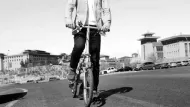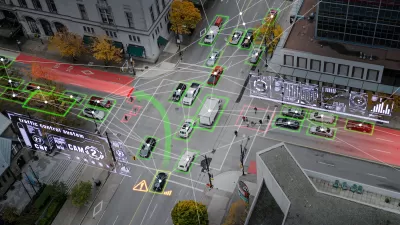Livable streets proponents look back on 2008 as the year some of the movement’s best laid plans became mainstream. Bicycle sharing systems launched in both Washington DC and Montreal. Auto-dependent Charlotte saw its LYNX light rail surpass 2025 ridership projections, while Seattle also beat ridership projections on its snazzy new Streetcar. And New York City and Portland continued to reclaim space for less auto-centric uses—witnessing 35% and 25% growth respectively in bicycle mode share.
Livable streets proponents look back on 2008 as the year
some of the movement's best laid plans became mainstream. Bicycle sharing
systems launched in both Washington DC
and Montreal. Auto-dependent Charlotte
saw its LYNX light rail surpass 2025 ridership projections, while Seattle also beat ridership projections on its snazzy new Streetcar. And New York City and Portland
continued to reclaim space for less auto-centric uses-witnessing 35% and 25%
growth respectively in bicycle mode share.
Perhaps garnering the most attention, however, was that America's most progressive cities finally embraced Bogota, Colombia's
renowned ciclovia-a transformative event that asserts that street space is
people space.
Last summer New York City, Chicago, Portland, and San Francisco all allowed
citizens to use freely the majority of their cities' open space-the streets.
Whether walking, bicycling, running,
skating, dancing, playing music, or just hanging out, city dwellers came out in
droves to enjoy a respite from the hegemony of the automobile.
In Miami,
Bike Miami Days may have been late to the party (the first event was held in November
of 2008), but it enjoyed so much success that Mayor Manny Diaz decided Miami would become the first city in the
nation to institute a ciclovia on a monthly basis. Indeed, Saturday, March 14th
will be our fifth such event.
Bike Miami Days PSA : March 14th from rydel high on Vimeo.
Despite initial naysayers, ciclovias have been good for business and for reducing crime, a fact that can't be ignored as so many retailers continue to struggle. In fact, downtown Miami
merchants protested when learning that Bike Miami Days might periodically migrate to other
neighborhoods, as businesses continue to have banner sales during the event.
More importantly, the open shops, throngs of people, and physical activity make
our moribund downtown seem livelier, safer and more intriguing on the weekend,
a time when an otherwise vibrant weekday 9 to 5 scene dies. This activity will
likely beget still more activity, as the car-free event familiarizes more and more people with the shops, restaurants, and businesses of the slowly
revitalizing downtown.
Additionally, giving urban dwellers an excuse to go out and meet each
other in a safe and active environment not only helps like minded people meet,
its helps everybody meet because ciclovias tend to become a mixing bowl of singles, couples,
families, and retirees. After all, exercise, socializing and people watching know no
class, creed, party line, race or age. Streets are for everyone.
The social relationships derived from such an event also combine with the economic
benefits to create what author Bill McKibben calls the ‘deep economy.' That is to say, the bonds of community may be overlooked in conventional economic analysis, but livable streets truly form the foundation of a good urban block, neighborhood, and city. Thus, the success of these events
prove that while American wealth is leaving the trading floor and the board
room at unprecedented rates, there can still be plenty of social capital created in our streets.
Using the success of 2008 as a catalyst for more livable
streets initiatives, America's
best cities show no signs of slowing.
Indeed, New York City
boldly announced two weeks ago that it will further pedestrianize its "Broadway Boulevard,"
by closing down large segments to motor vehicle traffic. Boston has announced plans for its own
bicycle sharing system. And finally, Mayor Gavin Newsom announced last week that San Francisco's Sunday
Streets program will not only return, but will follow Miami's monthly model between April and
September. As Newsom's spokesman stated this week, "every neighborhood in San Francisco deserves the
opportunity to have this vibrant scene in their neighborhoods." I expect we
will soon hear similar announcements from those aforementioned cities who ran successful
civlovias in 2008, and hopefully we will hear from some new ones.
So here's looking at you Atlanta,
Houston, and Seattle. Why not give your own livable
streets movement a jump-start, as well as your local businesses? Why not help your city's residents to step
outside of their day-to-day routine so that they can meet each other
in truly wonderful community-wide or neighborhood event?
Ciclovia has been transformative for my city, and if done right, it can be transformative for your city
too.

Planetizen Federal Action Tracker
A weekly monitor of how Trump’s orders and actions are impacting planners and planning in America.

Maui's Vacation Rental Debate Turns Ugly
Verbal attacks, misinformation campaigns and fistfights plague a high-stakes debate to convert thousands of vacation rentals into long-term housing.

San Francisco Suspends Traffic Calming Amidst Record Deaths
Citing “a challenging fiscal landscape,” the city will cease the program on the heels of 42 traffic deaths, including 24 pedestrians.

Defunct Pittsburgh Power Plant to Become Residential Tower
A decommissioned steam heat plant will be redeveloped into almost 100 affordable housing units.

Trump Prompts Restructuring of Transportation Research Board in “Unprecedented Overreach”
The TRB has eliminated more than half of its committees including those focused on climate, equity, and cities.

Amtrak Rolls Out New Orleans to Alabama “Mardi Gras” Train
The new service will operate morning and evening departures between Mobile and New Orleans.
Urban Design for Planners 1: Software Tools
This six-course series explores essential urban design concepts using open source software and equips planners with the tools they need to participate fully in the urban design process.
Planning for Universal Design
Learn the tools for implementing Universal Design in planning regulations.
Heyer Gruel & Associates PA
JM Goldson LLC
Custer County Colorado
City of Camden Redevelopment Agency
City of Astoria
Transportation Research & Education Center (TREC) at Portland State University
Jefferson Parish Government
Camden Redevelopment Agency
City of Claremont




























